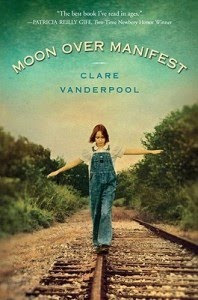 The Newbery-winning novel Moon Over Manifest made me cry, but anyone who knows me realizes I'm a sucker for plucky young heroines in hard times. Even if I hate the word plucky.
The Newbery-winning novel Moon Over Manifest made me cry, but anyone who knows me realizes I'm a sucker for plucky young heroines in hard times. Even if I hate the word plucky.
I liked the main character, the town of Manifest, and the mystery. Though I had a hard time shaking the impression that the book could have been called Out of the Holes Because of Winn Dixie. (Without the dog.)
The thing that shocked me about the book, though, was two very obvious editing errors. These weren't run-of-the-mill typos, either.
The first is on page 126, when Jinx tells the story of what happened in his past when Junior confronted Finn:
In one move, Finn wrenched the knife from Junior's hand and twisted his arm behind his back.Leaving aside the wonky antecedents in the first paragraph, the second paragraph has Finn wincing in pain because he is twisting Junior's arm behind his (Junior's, I assume) back.
Finn winced in pain. "I was just funning with you, Finn. I wouldn't have turned you in."
Did anyone proofread this part? It made the section hard to understand and completely disrupted the narrative.
The second is clearly an editing error. On pages 139 through 144, our heroine Abilene tells about sharing ginger snaps with her friends Lettie and Ruthanne. Lettie's mother had made the treats for a family birthday, after everyone gave up eggs for a week so they could trade for sugar to make a dozen cookies.
Lettie brings two cookies for Ruthanne and Abilene. The book clearly says that Ruthanne ate all of the cookie she's given, while Abilene shares half of hers with Lettie, despite her claim that she "already had my fill."
Yet a few pages later, Abilene narrates:
I admired how Ruthanne knew what I did not. That Lettie hadn't had her fill of gingersnaps. With six kids in her family, she had more than likely given up her own cookie and traded something for an extra one to share with us.I don't know when Ruthanne revealed this perceptiveness to Abilene, but it's not in the pages of the book. I reread the section three times looking for something I had missed, but it wasn't there. Again, a major disruption of the narrative.
On the positive side, it's a book that young readers will like, and it sheds light on some important parts of American history, such as Prohibition, exploitative company towns, the Klan, and anti-immigrant sentiments. And it includes this great bit of family advice:
Lettie and Ruthanne were away for a couple of days at their great-aunt Bert's second funeral. Her first, they said, had been on Aunt Bert's seventy-fourth birthday. She'd wanted to hear all the nice things folks would say about her, so they went ahead and held the services early.That passage alone made it worth reading, if not worthy of the Newbery Medal.
But this time was for real and Lettie said everyone was trying to come up with new nice things to say. Unfortunately, as Great Aunt Bert could be a bit cantankerous, they were having to be creative. According to Lettie, most of the family agreed that in the future, family members would be allowed only one funeral and they'd have to pick if it would be when they were dead or alive (pages 169-170).


No comments:
Post a Comment